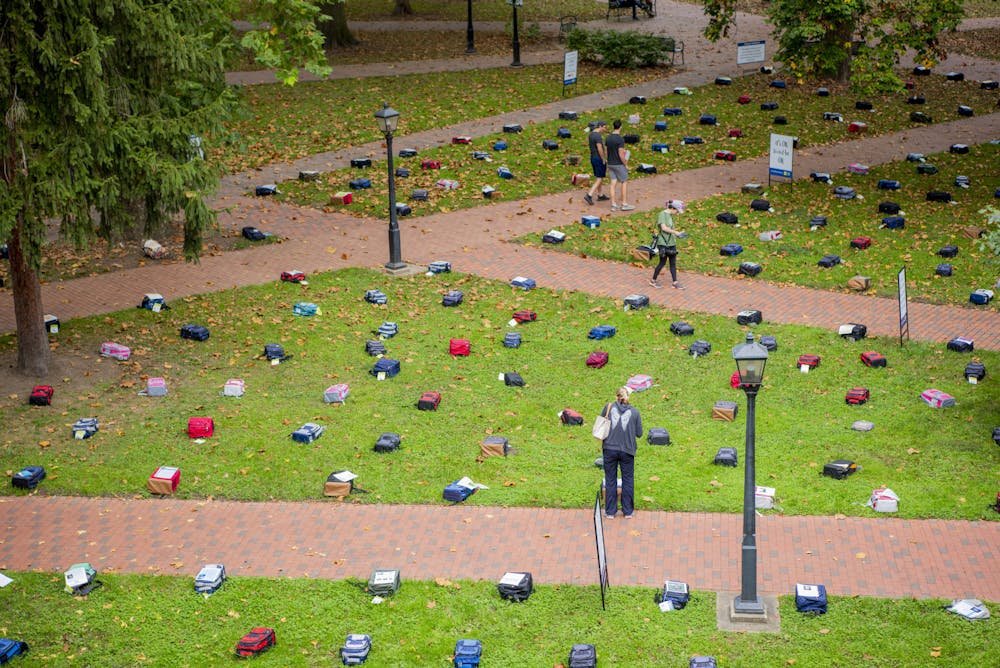College Green is usually full of students dashing from class to class, but Tuesday it was filled with something else: rows and rows of backpacks. They lined the criss-crossing pathways of College Green, and each bag closest to the walking paths had a laminated paper story attached. One spoke of a secret crush never given the opportunity to be shared, the next of a one-year anniversary that had gone uncelebrated and another of a 12-year-old boy who loved video games and soccer. Each is the story of a person or a group who lost their lives to suicide.
The interactive backpack exhibit is called “Send Silence Packing” and was put on by Active Minds, a nonprofit supporting education and resources for mental health. On Oct. 12, the exhibit was displayed to raise awareness about mental illness and the many lives it takes, encouraging those struggling to seek help.
David Lairmore, psychologist and outreach coordinator for Ohio University’s Counseling and Psychological Services, said this is the second time the exhibit has come to OU. Both times have been sponsored by the Ross Griffin Memorial Foundation, an organization founded for an OU student who lost their life to suicide.
Lairmore said despite “Send Silence Packing” already visiting in 2019, it is important to continue to host the display.
“I think people who (were) here in 2019 may have forgotten, or there's a bunch of new students that (are) here too, so I think we have to kind of keep reminding ourselves that this is something that has to be talked about, has to be dealt with,” Lairmore said.
The exhibit included around 900 backpacks, a number that has continued to grow as the exhibit has toured, said Aaron Plattus, a “Send Silence Packing” tour coordinator. Of the 900, many do not have stories attached.
Lairmore said this is likely because those backpacks haven’t been claimed by a family or friend on behalf of a loved one.
“The backpacks that don't have stories even tell another story with them because suicide is still stigmatized so much, and people don't realize that … help is there,” Lairmore said. “People worry to talk about it and worry about what it means to talk about it, so it just keeps perpetuating.”
Morgan Dick, a graduate assistant in the advanced standing one-year program for social work, volunteered at the event as a representative of the Survivor Advocacy Program, or SAP, on campus. She said the exhibit was especially meaningful to her because of the effect mental illness has had on her life.
“Losing a relative myself to suicide, it is definitely impactful,” Dick said. “I've had to take breaks several times after reading the stories.”
Abby Landreth, a freshman studying psychology who uses they/them pronouns, also shared a personal connection to the stories.
“I was walking through the park and I had read the trigger warning: ‘This deals with suicide,’” Landreth said. “I relate to this a lot. I've had family members pass away (and) numerous friends.”
Landreth said they felt the exhibit could help change visitors’ perspectives on seeking help.
“I just guarantee it will change someone's mind; someone will think this has an impact,” Landreth said. “It made me feel certainly emotional, definitely. It's a really tough thing to see just this many bookbags alone.”
Lairmore said he hopes the exhibit will help students understand there are resources available and the best thing to do is reach out.
“I think it's stigmatized,” Lairmore said. “People think it's a strength or ‘l can take care of this by myself,’ but in reality it's more of a strength that you can talk to someone, that you reach out for help. I hope students receive that message.”
Landreth encouraged fellow students to get help if they are struggling.
“It's OK not to feel 100%,” Landreth said. “I feel like seeing this, seeing other people have taken their lives, you don't have to take that route. There's help.”
To experience the exhibit online, people can visit Behind the Backpacks. If any students are struggling with their mental health, they can find additional campus resources through Counseling and Psychological Services by calling (740) 593-1616 for around the clock support.
Editor-in-Chief





